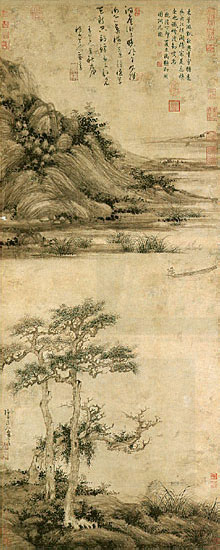Wu Zhen (painter)

Wu Zhen (simplified Chinese: 吴镇; traditional Chinese: 吳鎮; pinyin: Wú Zhèn) (courtesy name: Zhonggui 仲圭;art name: Meihuadaoren 梅花道人) (1280–1354 C.E.) was a Chinese painter during the Yuan dynasty.[1] He was best known for being one of the Four Masters of the Yuan.[2]
Biography
[edit]He was born in Weitang (now known as Chengguan). Most of his family is unknown.[3]
Zhen graduated being educated in philosophy and swordsmanship. Shortly after his graduation, he chose to become a painter. His paintings did not sell well, but he had close friends who taught him how to paint, including Wu Guan, Zhang Guan, and Tao Zhongyi.[4]
Artworks
[edit]Many of Zhen's artworks were landscape paintings and paintings of bamboo.[4] He also occasionally inserted poems into his artworks, which also helped him become better at calligraphy, poetry and artwork simultaneously.[3]
-
Wu Zhen, Hermit Fisherman on Lake Dongting
-
Wu Zhen, Fisherman, National Palace Museum
References
[edit]- ^ "Wu Zhen Paintings | Chinese Art Gallery | China Online Museum". China Online Museum. Retrieved 2020-06-12.
- ^ "Wu Zhen | Chinese painter". Encyclopedia Britannica. Retrieved 2020-06-12.
- ^ a b Wang, Tzi-Cheng (2001). "Wu Zhen's Poetic Inscriptions on Paintings". Bulletin of the School of Oriental and African Studies, University of London. 64 (2): 208–239. doi:10.1017/S0041977X0100012X. ISSN 0041-977X. JSTOR 3657669. S2CID 190680593.
- ^ a b Li, Chu-Tsing; Lu, Yun-Chen (2003). "Wu Zhen". Grove Art Online. doi:10.1093/gao/9781884446054.article.T092447. ISBN 9781884446054. Retrieved 2020-06-12.
External links
[edit]- Landscapes Clear and Radiant: The Art of Wang Hui (1632–1717), an exhibition catalog from The Metropolitan Museum of Art (fully available online as PDF), which contains material on Wu Zhen (see index)


